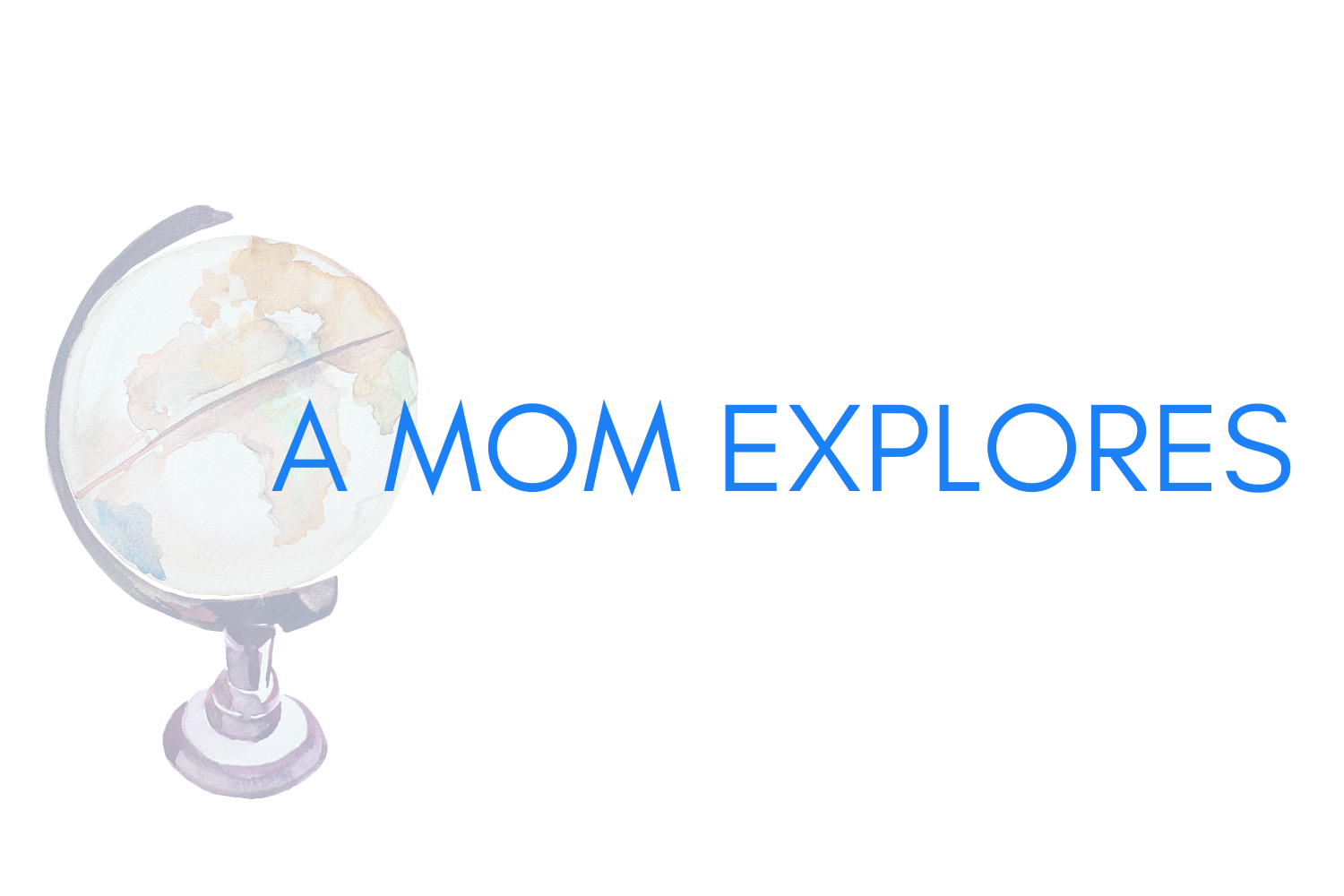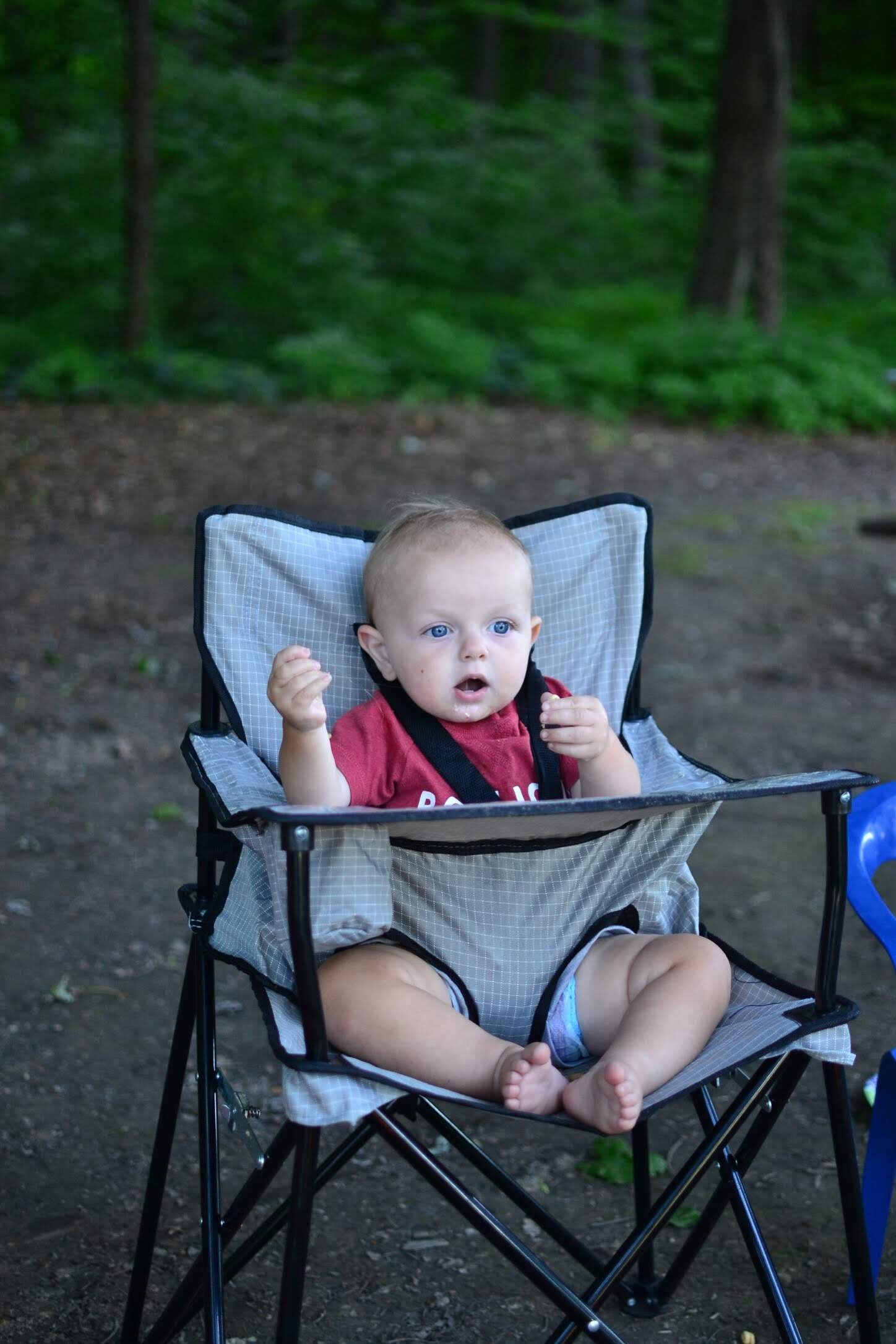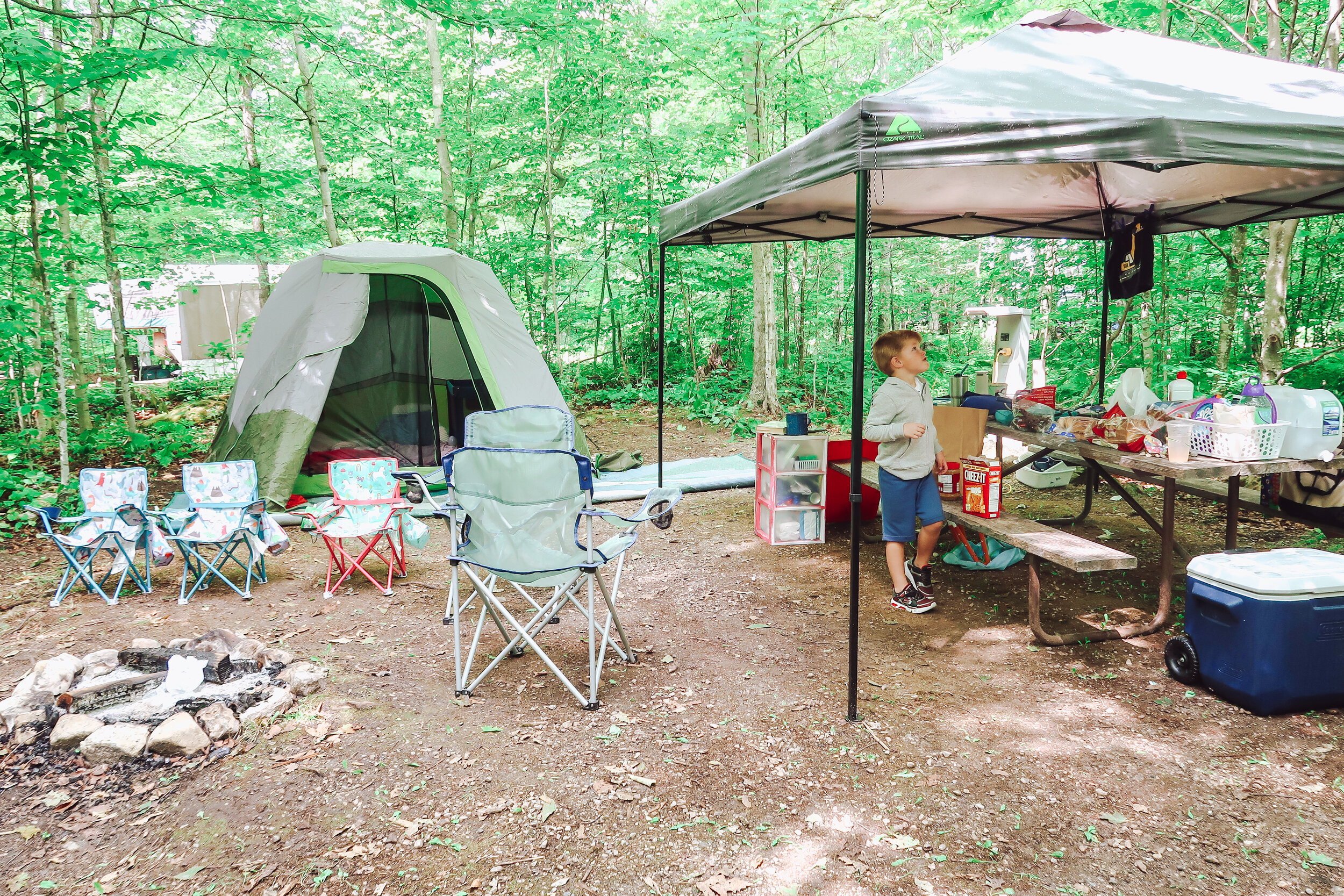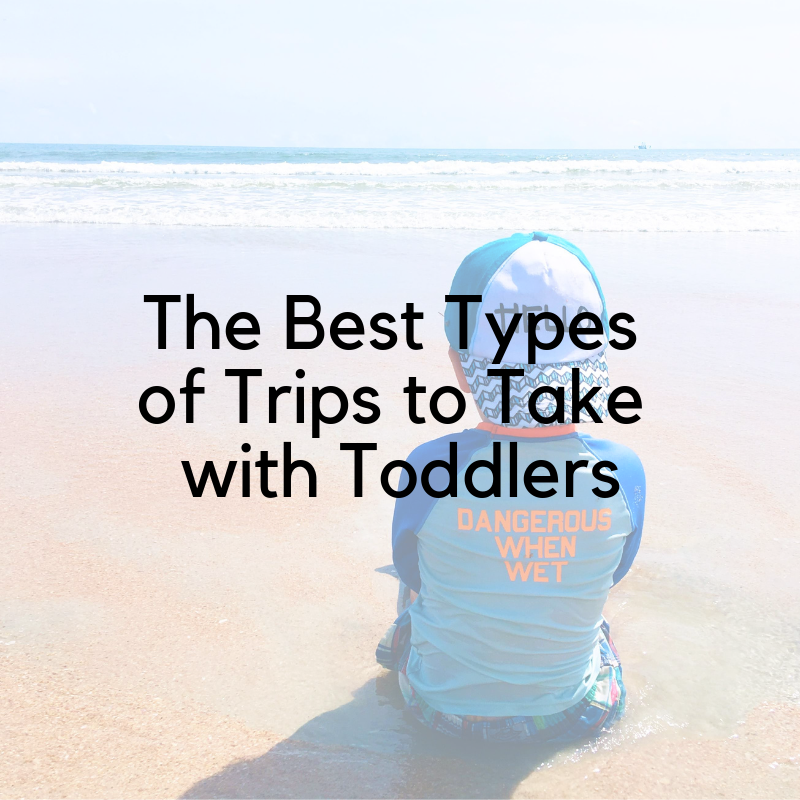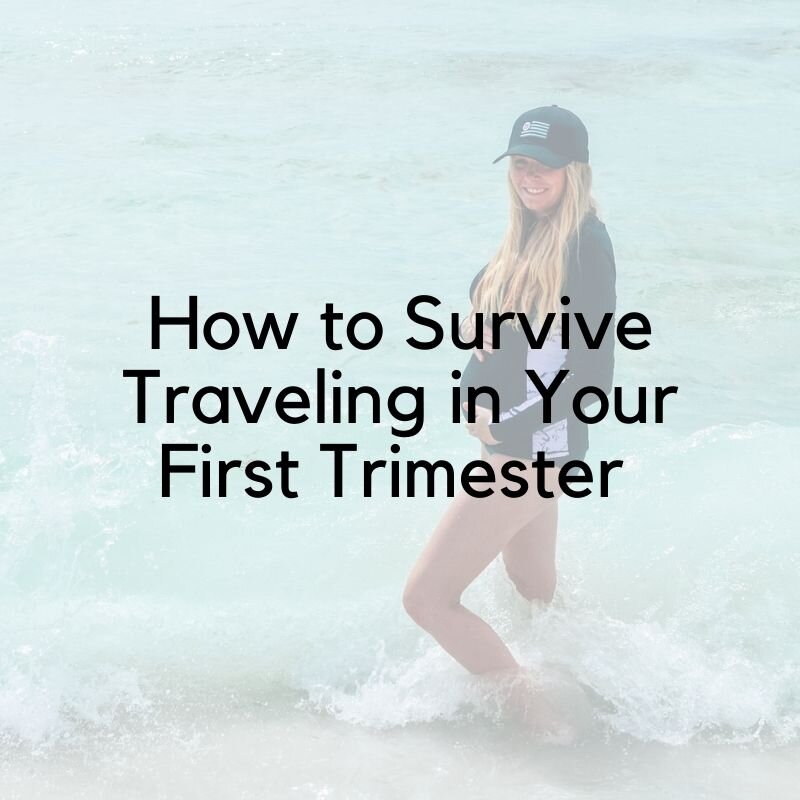What to Know When Camping with A Baby {Tips for Beginners & What to Bring}
Tips for Camping with a Baby
Camping with a baby doesn’t have to be hard! Preparing and packing up with the proper gear is the biggest obstacle to making memories around the campfire with the newest member of your family. Plus, the earlier you start taking your kids camping, the easier it will become!
Still, it’s a lot more work to bring your baby camping, so I thought I would share the tips and tricks we’ve learned over the years.
I’m a mom of 4, and I grew up going on yearly camping trips with my family. Now I’m excited to introduce my own kids to the great outdoors! We’ve done both tent camping and cabin camping with our kids as babies, so I’ll share what to bring, how to get baby to sleep in a tent, how to keep baby safe, and how to choose the best campsite.
Keep in mind - I’m not an expert camper. But that’s why I wanted to share these tips with you. Sometimes hardcore campers might not understand how big of a hurdle it is to just get started with all the gear and lingo. Since I’m just a few steps ahead in my “camping journey” I’ll relay some helpful tips for beginners.
Disclosure: This post contains affiliate links. That means if you click on a link and make a purchase. I may receive a small commission at no extra cost to you.
THINGS TO CONSIDER BEFORE CAMPING WITH A BABY
THE BABY’S AGE AND STAGE
During their first year of life babies go through so many different stages and phases, it can be hard to know when the best time to go camping is. There are certainly pros and cons to each age and stage.
MONTHS 1-3: The baby is still sleeping so much, this can be a great time to try camping! Little ones can fall asleep almost anywhere, so you can mostly go about doing your normal activities. The hard thing about this age is that Mom might still be recovering from the birth, parents might be sleep-deprived and adjusting to life with their new addition, and babies don’t have the strongest immune systems yet.
MONTHS 4-6: Uh-oh! The dreaded 4-month sleep regression can strike during this time! Let me tell you from experience that dealing with a sleep regression in a tent with 3 other kids is not necessarily my idea of fun. On the plus side, babies usually aren’t yet crawling and definitely not walking, so it’s easier to keep them contained in a bouncer or pack-n-play around the campsite.
MONTHS 6-9: Your child might just be starting solids at this time, which makes food prep a little more complicated. They might also be starting to crawl, so you’ll need to be alert and on your feet! And they’re putting EVERYTHING in their mouth. The good news about this age is that they’re awake a bit more and you start to see the pure joy on their faces when something is new and exciting.
MONTHS 9-12: QUICK. Your baby is almost a toddler. GET ALL YOUR TRIPS IN NOW! Seriously, though, at this age babies are starting to be mobile which is all fun and cute until you’re trying to keep them away from a campfire. On the plus side, you might be in a good routine with your baby, so the day might go a lot more smoothly.
If you’re about to start any sort of sleep training or night weaning, I would put it off until after your camping trip. You don’t want to wake up your campsite neighbors with a shrieking baby at 2 in the morning!
The same applies for if you’re about to start introducing solids. I prefer to be close to home and our pediatrician when we start that journey in case something goes wrong, but just consider what you’re comfortable with!
THE WEATHER
If it’s going to be extremely hot, extremely cold, or stormy, you might want to postpone your first camping trip with a baby.
Camping with babies is hard enough as it is and requires a ton of hands-on work and gear. Add to that the stress of dealing with keeping your child warm or cold in the extreme temperatures or dry if you’re stuck in a tent during an all-day thunderstorm? Miserable!
WILL YOU BE COMFORTABLE?
At the end of the day, be honest with yourself about what you’ll be comfortable doing. If you’re stressed and anxious, NO ONE will be having fun on that camping trip. If you can let yourself relax and figure it out as you go, if you can laugh at disasters and mistakes, and enjoy the little moments, you’ll do just fine.
Ask yourself a few questions and answer honestly before you book your first camping trip with a baby:
Are you a veteran parent or a first-timer?
Do you have experience camping or will your very first time be with a baby? That could be challenging.
Are you high strung or more laid back?
If you have your heart set on camping but you’re not sure if you’re quite ready for it yet, especially with a new baby, consider trying cabin camping, glamping, or staying in a remote Airbnb where you still have access to amenities like running water, toilets, showers, and electricity, but you’re also surrounded by the great outdoors.
TENT CAMPING WITH A BABY
Ok, so we’ve done several different kinds of camping with babies: tent camping in a state park, tent camping at a campground, and cabin camping at a campground.
I’m going to talk about tent camping since that can be a bit more challenging than a cabin stay.
CHOOSING A CAMPGROUND AND CAMPSITE
If you’re an inexperienced camper or a new parent, you may want to consider staying close to home or even doing a practice run at home to see how sleeping in a tent goes.
Do your research on what type of campsite you would prefer. Some campgrounds come with swimming pools, showers, indoor bathrooms, electricity at some campsites, and tons of games and activities to choose from.
Others offer some amenities by are kind of run down or the facilities are unclean. (Which is really not THAT big of a deal because you’re camping.)
Still others are more remote and don’t offer much in the way of facilities. Those can be really cool experiences where you’re more connected with nature, but definitely more inconvenient when you’re taking care of a baby.
When you’re selecting a campsite, keep in mind distance to other campers especially if your baby doesn’t sleep well at night. You might wake up other campers if you’re in close proximity, or other campers may wake up your baby which can be really frustrating.
WHAT TO BRING
I won’t include an entire packing list here. You can find my camping with kids packing checklist here and my baby travel essentials here.
A few specific baby items to bring for camping:
a bouncer or play yard where your baby can safely play outside
a portable sound machine for the tent to drown out the noise of other campers
a baby carrier for. hikes (we like the Lillebaby for every stage!)
extra socks for cold feet!
a lightweight wearable blanket and a warmer wearable blanket
TIPS FOR MAXIMIZING SLEEP
Sleep is not guaranteed with a baby even when you’re in the comfort of your own home, so don’t expect it to be perfect when you’re camping!
However, there are a few things you can do to make sure your baby, your family, and you get the most sleep you can.
Stagger bedtimes. If you have children of different ages, you can feed the baby and put them to bed before the other kids. Make sure the sound machine is on and a soft nightlight is on so sneaking into the tent won’t disturb baby’s sleep. Then enjoy special campfire time with the older kids!
Choose a campsite further away from other campers if possible. We had a loud group of young adults near us, and while they thankfully didn’t keep the baby awake, it was tough for me to fall back asleep after that 2 a.m. feeding. Also, if your baby is crying in the middle of the night, you won’t worry about waking up other people.
Make sure your baby is familiar with their pack & play or whatever portable bed they’ll be sleeping in. Have them play in it when they’re in a good mood, and maybe even try taking some naps in it prior to your camping trip.
Follow your naptime routine to the best of your ability. Sleep begets sleep, so if baby is getting good sleep during the day, they’re more likely to sleep soundly at night. This doesn’t mean you’re stuck at your campsite. You can do baby carrier naps or stroller naps, or have one parent do special outings with older kids while one parent hangs back for the baby’s nap.
MIDDLE OF THE NIGHT FEEDINGS
Our baby was going through the 4-month sleep regression when we went camping. That meant I was on-call for the middle of the night feedings.
I brought a backrest pillow for some back support while breastfeeding our baby in the tent, along with my portable touch-activated night light. It emits a soft glow that didn’t wake the other kids, and you can make it brighter or dimmer with just a touch.
FEEDING OLDER BABIES
For our most recent camping trip, our baby was still exclusively breastfed, so we didn’t have to worry about bottles or baby food.
On past trips, we have had to deal with bottles and baby food, so here are some of my best tips.
FORMULA-FED BABIES:
I had to supplement my 2 oldest with formula, so we have experience traveling with formula and bottles. Consider buying pre-mixed formula specifically for the camping trip. Or look for pre-measured formula dispensers and bring purified water specifically for mixing bottles.
Wash bottles in a separate tub with soap and water, and bring a bottle drying rack. If you have access to clean drinking water at your campsite you can use that. Otherwise, heat up some water over the campfire to sterilize bottles.
PUMPING MOMS
If you’re pumping, bring a cooler with plenty of ice where you can store breastmilk and keep it separate from food. Carefully label your breastmilk and use it within 24 hours of pumping.
If you have one, bring a manual pump in case you don’t have access to electricity or your pump runs out of battery. (Or bring a car charger so you can at least pump in the car).
SOLIDS
For older babies, bring a portable high chair and wipeable bibs to feed your baby solids.
Fruit pouches, puffs, cheerios, bananas, and small pieces. of whatever you’re eating are your best friend.
If you prefer purees, now might be the time to splurge on baby food jars!
CONTAINMENT
I already mentioned this above, but make sure you have a plan for containing and entertaining your baby outside while you’re making dinner or setting up camp, especially if your baby is mobile!
With our 5-month-old this bouncer was a huge hit! She was happy and safe in it. If your baby is a little older, consider a play yard where they can crawl and play with toys safely.
CLOTHES TO BRING FOR CAMPING WITH A BABY
COMFORTABLE SLEEP CLOTHES
Tents can get warm and stuffy with no air circulating, especially if it’s humid outside. Stick with just a onesie or a lightweight pair of pajamas to keep baby cool at night.
If the temps drop overnight and you’re worried about keeping your baby warm, layers are your best friend. Start with a lightweight pair of pajamas with socks underneath. You can use an infant sleep sack if it’s not too cold (above 60º).
If it looks like it will truly get chilly, bring a warm fleece or wool sleepsuit that covers the baby’s hands.
LAYERS FOR PROTECTION
Since you’ll be spending the majority of time outdoors, you’ll need to think about sun and bug protection. If your baby is younger than 6 months, it is not recommended to use sunscreen or bug spray. Instead, dress them in lightweight long sleeves and pants and keep them in the shad to protect them from the sun and bugs.
Don’t forget sun hats and sunglasses, too!
You can also look for baby mosquito nets to cover strollers or play yards, as well as mosquito net tents.
If your baby is older than 6 months, look for baby-safe products for sun and bug protection like this sunscreen and this bug spray.
WATERPROOF JACKET
Don’t forget to bring a raincoat or a lightweight waterproof jacket for your baby in case of rain showers! Whether you’re out hiking or just hanging at the campsite, a warm and dry baby is a happy baby.
DIAPER CHANGES
One of the most important things to bring (more than you think you’ll need) is diapers. Now is not the time to try to be minimalist! You don’t want to run out of diapers when you’re camping.
Bring unscented wipes to avoid attracting bugs, and a nice thick changing mat to keep baby comfortable during diaper changes.
FINAL TIPS FOR BRINGING YOUR BABY CAMPING
STAY BUSY
Our family has found that the more we keep busy during the day, the easier it is to camp with a baby. When we’re trying to just relax and hang out around the campfire, we realize that it’s actually not so relaxing. Babies require constant attention and care, so try to save your relaxing for baby’s nap time.
For the rest of the day, get out in nature, hike, play mini-golf, swim, and just explore your surroundings. Everyone will be nice and tired out from the fresh air and movement, including the baby.
DON’T OVERDO IT
We definitely overestimated our ability to sleep in a tent with 4 kids (one of whom was a baby not yet sleeping through the night) and booked 3 nights at a campsite.
Being as stubborn as I am, I didn’t want to admit how hard it was and go home a day early. However, a nasty bout of mastitis sent us packing before our 3rd night, and we were all thrilled to be back in our own beds that evening.
Start with 1 or 2 nights max, then work your way up as you get more comfortable with camping.
EXPECTATIONS VS REALITY
When doing any type of travel with a baby, it’s best to keep your expectations in check. I love to romanticize travel with my kids, but the reality always ends up being so much harder. When reality clashes with my expectations I get crabby and frustrated.
When I go into a trip expecting it to be a lot of work, I’m prepared to be patient and to laugh off any mistakes or disasters.
Give yourself grace, be patient with your baby, and you’ll end up making some wonderful memories camping with the newest member of your family.
What tips did I miss? Do you have any hacks for camping with a baby? Share them below!
DON’T FORGET IT! PIN IT!
Emily Krause is a Florida-based travel blogger who writes about exploring the world with kids. On A Mom Explores you’ll find best family travel destinations, Disney World tips, and how to make travel with babies and toddlers a little easier.
Emily believes that exploring starts in our own backyards, and adventure can happen anywhere with the right mindset.
